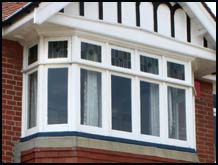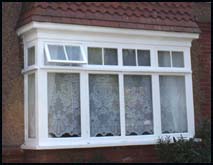Federation Bay Windows
[previous page: 2-Storey Federation next page: Federation Floor and Path Tiling]Table of Contents
Cosiness with Light:
Bay Windows
- Bay windows became a hugely popular feature of Queen Anne residential architecture in theBritish Isles from about the 1870s and hold a continuous appeal up to this day.
 |
| Bay window with arch but no window seat |
- Bay windows are used to increase the flow of natural light into a building, thereby also making a room appear larger, and to provide views of the outside which would be unavailable with an ordinary flat window.[5]
|
|
What is a bay window?


A bay window is a series of windows assembled in a polygon shape that project outward from the face of a house.- Source: Aust Window Association FAQs
Generally composed of three individual windows with the side units at 45 degree or 30 degree angles to the wall. -Source - Stegbar
An "angle bay window" refers to the angle of departure from the plane of the wall. Source: Language of Windows
| A bay window is a window space projecting outward from the main walls of a building and forming a bay in a room, either square or polygonal in plan. The angles most commonly used on the inside corners of the bay are 90, 135 and 150 degrees. Wikipedia A bow window is a curved bay window. Bow windows are designed to create space by projecting beyond the exterior wall of a building, and to provide a wider view of the garden or street outside and typically combine four or more casement windows, which join together to form an arch. |
Bay Windows from Freepedia
 |
| Oriel window above, and bay window below at Devon, Martin Road, Centennial Park |
In 1894 the UK Building Act changed the regulations, so that windows no longer had to be flush with the exterior wall. This enabled windows to stand proud from the facade.
The late Victorian and Edwardian period took advantage of the change in new building regulations and now presented their windows in bays. Medium and larger houses would often display double bay or bow windows.
A bay window creates the illusion of a larger room. It also maximizes the amount of light entering a room and offers a dryer alternative to a balcony.
A bay window extrudes from a main exterior wall, forming a space framed by three or more windows. The space may be square, polygonal, or round depending on the type of structure. Traditional bay windows are built with inside angles of 90, 135 and 150 degrees, although there are many custom variations.
 |  |  |  |
History of Bay Windows
from: ehow.co.uk |
| Unusual double bay-windows in Haberfield |
Bay windows can be found in architecture dating back to the early English Renaissance, where the idea is thought to have come from large bay rooms placed at the ends of great halls in mansions and castles.
Unusual double bay-windows in Haberfield
A surge in popularity is most notable during the late Victorian and Edwardian periods. In England, bay windows came back into style after the London Building Act of 1894 allowed a change in building regulations requiring windows to be flush with exterior walls. At the same time, bay windows began showing up in America, and became rampant in the West during the California Gold Rush.
Box Bay Window
A box bay uses a 90-degree angle to form a protruding box shape. Traditional box styles have a large bay or double-paned window flanked by a smaller window on each side. A sitting area or shelves may be added to the interior. Box bay structures are often found in kitchens as garden windows.
|
|
|
Bow Window
 |
| Randwick Oriel bay window |
 |
| 8 Crescent Street Haberfield |
These types of windows showed up during the Georgian period and became fashionable in Regency-style architecture. Bow windows were popular additions to English country homes because it made a person feel outdoors while in the comfort of the home.
Circle Bay Window

A circle bay structure is a more extreme version of the bow window, joining a combination of windows together into a smooth circular area. They are often wrapped around building corners.
Circle bay windows came into vogue during the Gothic era and are popular in master bedroom suites, living rooms, and dining nooks.
Oriel Window
Oriel windows are rounded window structures built on the upper levels of a building. They are usually supported by brackets or corbels and do not reach ground level.They originated with the idea of creating an upper-level porch area. Oriel windows became popular during the Gothic Revival and are often found in Arabian architecture, where they are called mashrabiyas.
 |  |  |  |
|
|
|
|
|
Window seats
A window seat is a miniature sofa without a back, intended to fill the recess of a window.- In the latter part of the 18th century, when tall narrow sash windows were almost universal, the window seat was in high favor.
- A window seat is a seating area in an alcove or nook that is lined with windows.
- These seating areas have romantic associations, as many people idealize the sense of luxury and spare time that they suggest.
- Typically, the seat is installed in an area with an attractive view, so that someone seated in it can enjoy the beauty of the outdoors while working on a project that requires natural light, such as knitting.
- Such seats are also used for reading or simply enjoying a respite from daily life.[6]
- A bay window is a natural spot for a window seat.
|
| ||
|












No comments:
Post a Comment